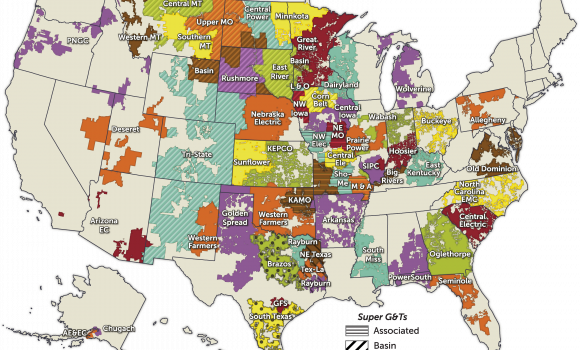
From the low deserts of southern New Mexico, to the high mountain peaks of northern Montana and beyond, this bucolic region this year is enjoying a blessed winter with much snowfall, consistent blustery days and attendant cold weather. In the midst of this --- as if decreed by the weather Gods --- the weather recently changed abruptly and briefly just for one weekend.
The weekend of January 19th brought two days of sunny, mild weather; just enough time for a group of Colorado and New Mexico based Rural Electric Coops (RECs) to assemble for a one-day historical, multi-purpose gathering at a convenient venue in northern New Mexico (the Cities of Gold Hotel, Pojoaque NM). Historical indeed --- this was the first time ever that these RECs had gathered without the heavy-handed interloping sponsorship --- or some would say, in defiance off --- their wholesale provider, Tri-State Generation and Transmission Association (Tri-State Assoc.). Tri-State Assoc. is a wholesale electricity supplier owned by the 43 RECs it provides power to throughout Colorado, New Mexico, Wyoming and Nebraska. The event was organized by three Colorado and New Mexico based We Own It Fellows: Emily Bowie, Holly Metzler and Luis Torres.
The common thread among the RECs in attendance is their affiliation with Tri-State Assoc.; all are similarly shackled by long-term contractual arrangements imposed on them by Tri-State Assoc. The best known of numerous contracts between Tri-State Assoc. and its affiliated RECs limits the RECs from producing or purchasing any of their needed power in excess of 5% from sources other than Tri-State Assoc. Stated another way: The RECs are compelled to purchase a minimum of 95% of their electricity from Tri-State Assoc. This blatantly one-sided arrangement has the deleterious effect of stifling what would otherwise be a natural transition away from fossil fuels (i.e. coal and natural gas) toward deployment of now less expensive renewable energy resources (i. e. wind and solar). Through these contracts Tri-State Assoc. has a stranglehold on the both the local economic development potential and future health improvement opportunities for the 43 RECs located throughout the Rocky Mountain west.
Four years ago, Kit Carson Electric Coop. (KCEC) located in Taos, NM, who at that time was also a Tri-State Assoc. affiliate, managed to extricate itself from that affiliation. KCEC managed to achieve this after a long drawn out process that culminated with KCEC paying Tri-State Assoc. a $37 million “contract termination fee”. Since then, KCEC has deployed numerous solar array projects throughout its service area, established a propane distribution subsidiary and improved extensive broadband services. Through these initiatives, KCEC has become an exemplary economic development force for its service area. A KCEC member-owner who attended the Cities of Gold gathering also informed us that KCEC is on schedule to achieve 100% daytime renewable power by 2022.
Successes like those being achieved by KCEC, both in deployment of renewable energy resources, saving members money and serving as a local economic development engine for its region, is what other RECs also want. However, as became apparent at this gathering, the principal deterrent to this is their affiliation with Tri-State Assoc. Not only are the contractual arrangements a major “legal” obstacle but the discussions also revealed that the RECs have not received adequate information, much less training or encouragement, regarding the benefits associated with deployment of renewable energy resources. How can anyone want something that one knows nothing about?
At the Cities of Gold gathering attendees learned that Delta-Montrose Electric Co-op. (DMEA) headquartered in Delta, Colorado, following in KCEC’s footsteps, has taken steps to leave the Tri-State Assoc. orbit. That case is now being adjudicated before the Colorado Public Utilities Commission. We also learned that United Power, the largest of the Tri-State Assoc. affiliates, is aggressively pursuing changes to Tri-States Assoc.’s bylaws that would significantly alter the relationship between Tri-State Assoc. and its member RECs.
Across the United States there are nearly 800 electric distribution co-ops; most of them purchase their electricity from wholesaler G & T Associations similar to Tri-State Assoc. Emerging data indicate that as high as 80% to 90% of these RECs struggle with obstacles similar to those mentioned above.
But as stated earlier: The winds of change are gathering! A new generation of trustees is starting to populate the boards of these RECs. The days when these boards served primarily as patronage and per-diem pastures for low-tier politicians are quickly coming to an end.

